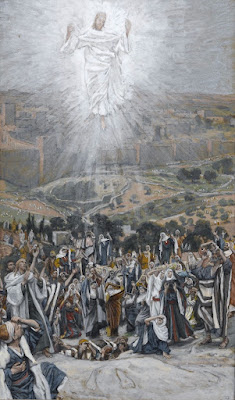Ascension of the Lord
Fr. Philip Neri Powell OP
OLR, NOLA
Right before their eyes, Jesus rises into the clouds and vanishes. Understandably, the disciples are astonished. They just stand there gawking, mumbling among themselves. Two angels appear and ask a truly bizarre question: “Why are you standing there looking at the sky?” Um, maybe because we just watched our teacher and friend shoot off into the heavens! Not something one sees everyday. Surely the angels know that Jesus has ascended to the Father. And surely they know why the disciples are surprised by the event. So why ask them why they standing there looking at the sky? The question has a rhetorical feel to it. I mean, it's meant to make them think about Jesus' ascension as one more event in a long list of astonishing events that started with the Gabriel's visit to Mary. If you get that Jesus is the Son given flesh and bone; and you get that he came to suffer and die and rise again for the forgiveness of sin; and you get that he visited you in the flesh after he rose; if you get all of that, then why are you standing there looking at the sky? Given all that has happened, why is his ascension so astonishing? The angels understand that the disciples do not. Understand, that is. Do we?
Do we get the Ascension? Sure, we know that it's about Jesus being taken up into heaven after his post-resurrection visitation with his disciples. He appeared to them in a locked room. Doubting Thomas poked his fingers into the Lord's wounds. Jesus walked with some of them on the Road to Emmaus. He was with them when Peter took an unexpected swim during a storm while fishing. Then, one day, Jesus, right before their eyes, whooshes up into the clouds. We know this much. But do we know why the ascension happened? What it tells us about us and our way to perfection in heaven? The key to understanding the Ascension is to remember that everything that happened to Jesus is happening and will happen to his Body, the Church, and is happening and will happen to each one of us as members of the Body. We follow Christ. Where he went, where he goes, and where he will go. We follow. The Ascension reveals that we too will rise with the Lord and sit at the right hand of the Father. This is made possible by the Son taking on our human nature, becoming sin for us, and freely dying and rising again to kill death. With his Resurrection, our fallen human nature is healed. With his Ascension, our perfected human nature is raised to eternal life.
Of course, none of this will happen without us. That is, God will not save us or raise us up without our cooperation, without us working along with Him to achieve this end. He wills that we all return to Him. He also wills that we do so freely. And this is why the angels ask the disciples their rhetorical question: why are you standing there looking at the sky? The subtext of the question is: you have work to do! Stop gawking at the clouds and get busy! Get busy doing what exactly? Get busy following Christ in the world. Get busy preaching and teaching his Word. Get busy healing, freeing, witnessing, feeding, and taking care of his people. Get busy growing in holiness: on being Christ in the world and not being of the world. Get busy living out the Way and the Truth. Get busy forgiving, loving, and showing mercy. Get busy with surrendering control to God and giving Him thanks and praise for His abundant gifts. All this busyness may sound like frenzied effort, like frantic activity. So, following Christ means that we're all to become Marthas? Running around, working ourselves to the bone? No. Our busyness is about intent and focus. It's about putting first things first. It's about keeping the end in mind, the goal squarely set upon our hearts.
That end, that goal is perfect union with the Father in heaven. The Ascension reveals to us that we are created by the Father and recreated by the Son to live in the Lord's presence eternally. That is God's will for us. We are free to choose this end or reject it. That is also God's will for us. Christ's death, resurrection, and ascension make our free choice possible by freeing us from the slavery of sin. Now that we are free, we can choose. If you choose your supernatural end – life eternal in heaven – then you act out that choice by doing all that the Lord did. Everyday. All day. Until you die. If you choose to reject your supernatural end, then you freely give yourself back to sin and live eternally as you lived temporally, refusing to receive God's love. In his justice and love, God respects your choice. And you are separated from God and the company of the blessed. Your choice. The Ascension – along with all of the other astonishing events of the Gospels – encourages us to look past and through a life lived according to the world's standards and onto a life lived as a Christ growing in holiness. So, the angels ask, why are you standing there looking at the sky? Get busy getting holy!




.jpg)
.jpg)
.jpg)
.jpg)

